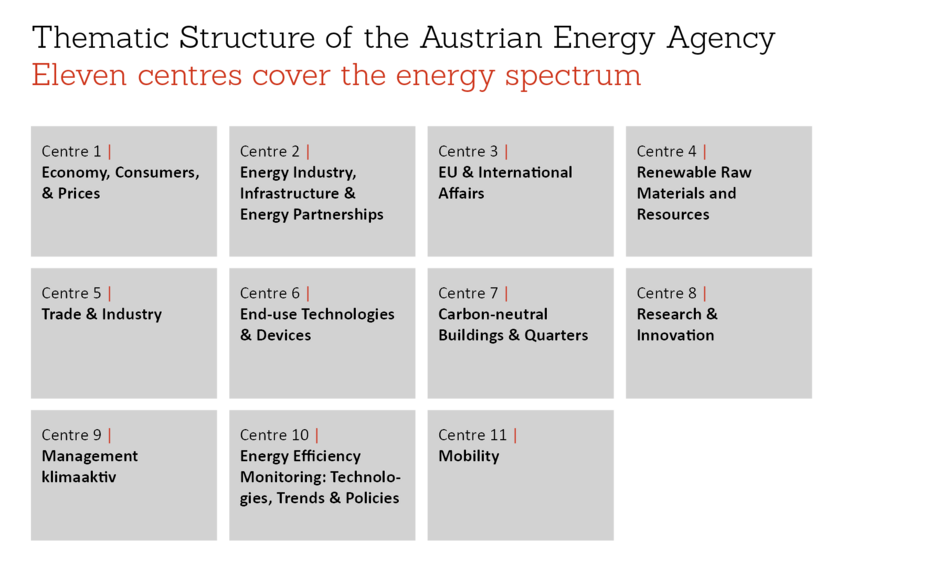
Our Centres
Thematic Structure of the Austrian Energy Agency:
Eleven centres cover the wide spectrum of the energy world

Centre 1: Economy, Consumers, & Prices
Centre 1 focuses on scientific studies on the topics of national economy, consumers, and prices. The work ranges from preparation to execution and support of measures aimed at achieving economically optimal and sustainable supply and/or use of energy.
Centre 2: Energy Industry, Infrastructure, & Energy Partnerships
Centre 2 considers the energy industry specifically from the perspective of the supply chain; this includes generation, transmission, distribution, and delivery. Energy strategies and concepts are developed to ensure security of supply. Additionally, the centre deals with the energy system of the future, the internal energy market, the use of renewable energy sources, and the market penetration of new energy technologies.
Centre 3: EU & International Affairs
This centre concentrates on the development of energy policy strategies, guidelines, (action) plans, and similar matters outside of Austria, especially in the field of renewable energy sources, energy efficiency, and sustainable energy supply. The support of EU member states and EU neighbouring countries at the energy policy level in implementing the EU acquis communautaire plays an important role. In addition, Centre 3 coordinates and directs AEA activities for UNIDO and supports energy-related activities of the Austrian Development Agency.
Centre 4: Renewable Raw Materials and Resources
For an efficient circular economy and domestic security of supply, natural resources and renewable raw materials (Nawaro) play an vital role. Centre 4 deals, for example, with framework conditions and the energetic and/or material use of renewable resources. In addition to promoting renewable raw materials within a bio-based economy, the centre focuses on the analysis and modelling of closed material cycles.
Centre 5: Trade & Industry
Centre 5 develops support instruments and programmes for increasing energy efficiency in the industrial and commercial sectors and evaluates energy efficiency measures to optimise commercial and industrial processes. Furthermore, the centre assists businesses in strategically realigning themselves to achieve climate neutrality and offers specific training for energy experts.
Centre 6: End-use Technologies & Devices
The focus of Centre 6 is on the household and service sectors. It deals with everything used within these areas, including household appliances, consumer electronics, information technology, lighting, heating, hot water, air conditioning, commercial cooling, and other device technologies. The centre is also tasked with the management of topprodukte.at, an information platform of the climate protection initiative klimaaktiv. This platform serves to disseminate information to both consumers and procurers about the most energy-saving devices and products currently available in Austria.
Centre 7: Carbon-neutral Buildings & Quarters
Centre 7 deals with climate-neutral buildings and quarters. Specifically, work is being done on EU directives and their implementation in Austria. The further development of the energy performance certificate for buildings is just as much on the centre's agenda as the formulation of renovation strategies. Additionally, the centre is dedicated to conduct training programmes to achieve nearly zero energy buildings (NZEB) and introduce innovative systems for climate-neutral quarters.
Centre 8: Research & Innovation
Centre 8 specialises in offering strategic advice to federal ministries on energy-related issues in the field of research and innovation (R&I). Central to its works is the monitoring of R&I activities in Austria, as well as programmes and strategies for R&I in the Energy Union (SET Plan) and the International Energy Agency (IEA). The centre also tackles topics such as mobility and transport, emphasising alternative drives like electromobility and alternative fuels.
Centre 9: Management klimaaktiv
klimaaktiv is the climate protection initiative of the Federal Ministry for Climate Protection, Environment, Energy, Mobility, Innovation, and Technology (BMK) and is part of the Austrian climate strategy. Its aim is to promote market penetration and rapid dissemination of climate-friendly technologies and services.
Centre 9 has been operationally implementing klimaaktiv on behalf of the BMK since its launch in 2004. It coordinates programmes in the areas of construction and renovation, energy saving, renewable energies, and mobility (see Management klimaaktiv mobil). Further tasks include target group information and partner management.
klimaaktiv targets key areas of influence: through consultancy and qualification in various sectors, transparent standards for construction and renovation, quality assurance measures, subsidies (klimaaktiv mobil), and active networking of relevant actors from business and administration.
Centre 10: Energy Efficiency Monitoring: Technologies, Trends, & Policies
Centre 10 deals with both energy-efficient and climate-neutral technologies and systems. Building upon the activities of the former Energy Efficiency Monitoring Body, it identifies energy-efficient and climate-friendly technologies and measures and analyses their future potential. Its portfolio is complemented by studies on current trends and energy efficiency policies.
Centre 11: Mobility
Energy-efficient, climate-friendly, resilient, comfortable, clean, healthy, safe, inclusive – our mobility system will change dynamically by 2040. Centre 10 is accompanying these transformations: scientifically, through research at the interface of energy and mobility, and organisationally and practically, through the implementation of klimaaktiv mobil. This initiative in the mobility sector, led by the Ministry of Climate Protection, emphasises active mobility (cycling and walking) and mobility management. Through these efforts, the centre contributes to upgrading the infrastructure in Austria (such as bicycle highways, charging infrastructure) while also encouraging and supporting behavioural changes and process improvements among households, businesses, organisations, schools, youth institutions, municipalities, and cities.